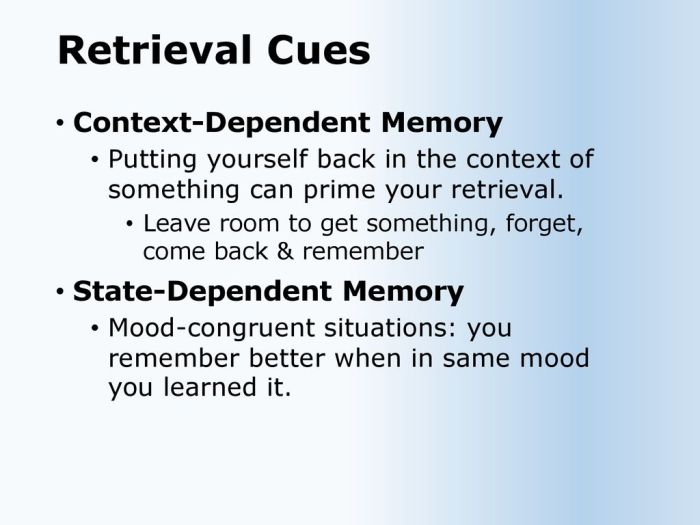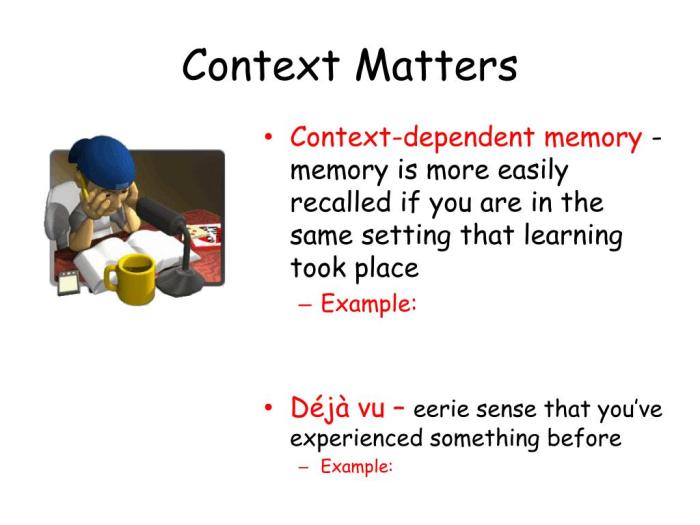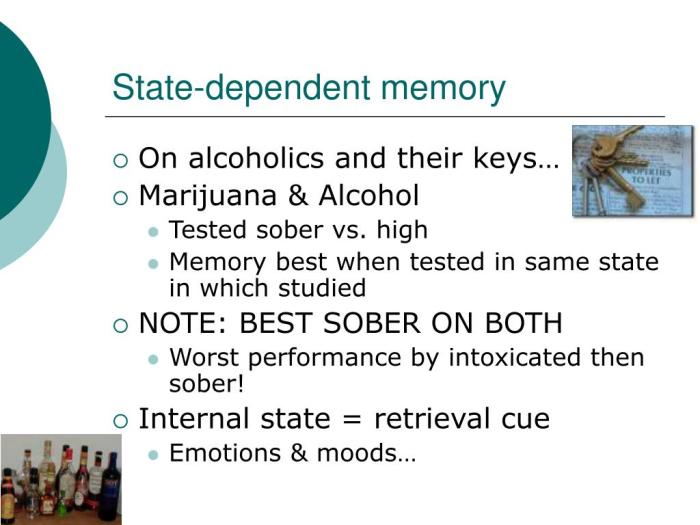Context and state dependent memory worksheet – Delving into the realm of context and state-dependent memory, this comprehensive worksheet unveils the intricate relationship between our environment, internal states, and the remarkable ability of our minds to store and retrieve memories. Prepare to embark on a journey that unravels the profound impact of context and state on our cognitive experiences, shaping learning, behavior, and the very fabric of our memories.
Context-dependent memory explores the profound influence of our surroundings on memory recall, demonstrating how familiar cues can trigger a flood of forgotten memories. State-dependent memory, on the other hand, delves into the fascinating interplay between our internal states, such as mood or drug use, and the accessibility of specific memories.
Introduction
Memory is not a passive recording of events but rather an active process that is influenced by our current context and state. Context-dependent memory refers to the phenomenon where memory recall is enhanced when the context in which the memory was formed is reinstated.
State-dependent memory, on the other hand, refers to the phenomenon where memory recall is enhanced when the internal state of the individual at the time of retrieval matches the internal state at the time of encoding.
Context-Dependent Memory

The environment plays a crucial role in memory recall. Contextual cues, such as sights, sounds, smells, and tastes, can trigger memories that would otherwise be forgotten. For example, the smell of freshly baked bread may remind us of our childhood home.
This is because the hippocampus, a brain region involved in memory formation, is also involved in processing sensory information. When we encounter a familiar context, the hippocampus reactivates the same neural pathways that were active when the memory was formed, making it more likely that we will recall the memory.
Examples of Context-Dependent Memory, Context and state dependent memory worksheet
- The restaurant effect:People are better able to recall information when they are in the same restaurant where they first learned it.
- The mood-congruent effect:People are more likely to recall memories that are consistent with their current mood.
- The state-dependent effect:People are more likely to recall memories that were formed while they were in a particular state of mind.
State-Dependent Memory

State-dependent memory differs from context-dependent memory in that it is not the external environment that influences memory recall, but rather the internal state of the individual. For example, people who are intoxicated are more likely to recall memories that they formed while they were intoxicated.
This is because the hippocampus is also involved in processing emotional information. When we are in a particular state of mind, the hippocampus reactivates the same neural pathways that were active when the memory was formed, making it more likely that we will recall the memory.
Examples of State-Dependent Memory
- The alcohol-induced blackout:People who blackout while drinking alcohol are often unable to recall events that occurred during the blackout, even though they may have been conscious at the time.
- The post-traumatic stress disorder (PTSD) flashback:People with PTSD may experience flashbacks of traumatic events that they witnessed or experienced. These flashbacks are often triggered by cues that are similar to the cues that were present at the time of the trauma.
Implications for Learning and Behavior: Context And State Dependent Memory Worksheet

The findings on context and state-dependent memory have important implications for learning and behavior. For example, educators can use contextual cues to enhance learning and memory. For example, they can use visual aids, such as pictures and diagrams, to help students learn new material.
They can also use music to create a positive learning environment. In addition, educators can help students to overcome the limitations of context and state-dependent memory by providing them with opportunities to practice recalling information in different contexts and states.
Quick FAQs
What is the key difference between context-dependent and state-dependent memory?
Context-dependent memory relies on external cues from the environment to trigger recall, while state-dependent memory is influenced by internal factors such as mood or drug use.
How can we use context and state-dependent memory to enhance learning?
By incorporating contextual cues into learning materials and creating a conducive learning environment, we can leverage context-dependent memory to improve retention. Additionally, studying in a similar state to the one in which the material will be tested (state-dependent memory) can enhance recall.
What are some real-world examples of context and state-dependent memory?
Context-dependent memory: Recalling a childhood memory when visiting your old neighborhood. State-dependent memory: Feeling more creative when listening to a specific type of music.